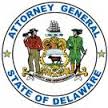Description of the office
The attorney general is elected to a four-year term in the "off-year" state election along with the state treasurer and state auditor, two years before/after the election of the governor. The attorney general, the state treasurer, state auditor, and state insurance commissioner offices are intended to serve as restraints to the governor's exclusive executive authority. The attorney general office existed in various forms prior to the ratification of the Delaware Constitution of 1776, which continued the existing colonial tradition of granting the governor the power to appoint the attorney general for a five-year tenure. With the ratification of the Delaware Constitution of 1897, the post was converted to its present four-year elected form, also establishing the attorney general as third in line of succession to the office of governor, after the lieutenant governor and secretary of state.
This page is based on this
Wikipedia article Text is available under the
CC BY-SA 4.0 license; additional terms may apply.
Images, videos and audio are available under their respective licenses.

















